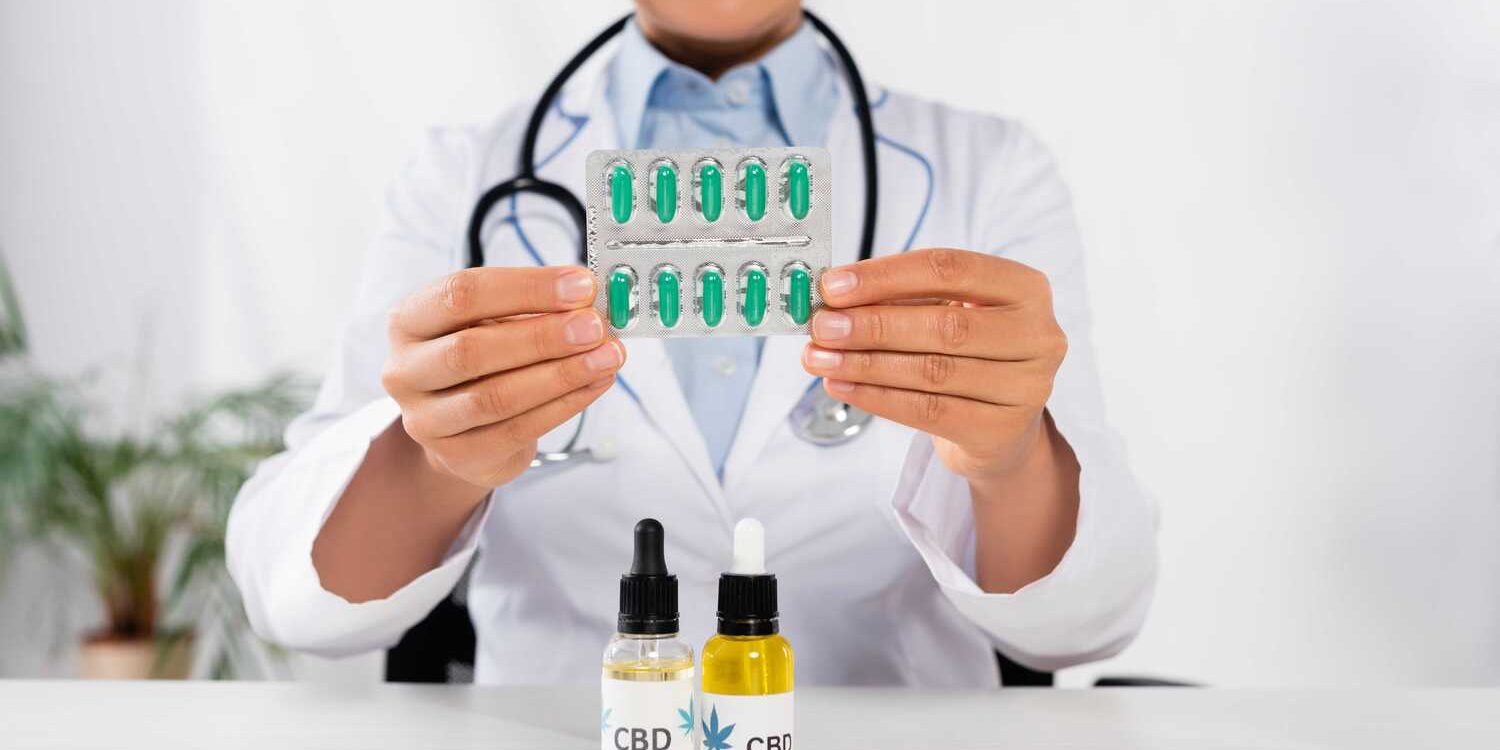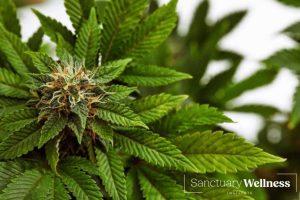- Jake Peter
- Published: March 1, 2024
- Fact-checked by Dr. Desiree Granados

In the rapidly evolving world of wellness and natural therapies, cannabinoids have seized the spotlight. Among the plethora of compounds found in the cannabis plant, cannabidiol (CBD) has been the most celebrated for its therapeutic properties. However, emerging research and user experiences are bringing another cannabinoid known as cannabigerol (CBG) into the limelight.
This article will unravel the mysteries of CBG and CBD, exploring their differences and unpacking why understanding them is crucial for consumers looking to tailor their cannabis use to their specific needs.
What Is CBD?
CBD, or cannabidiol, is a naturally occurring compound found in the cannabis plant. Unlike its more famous counterpart, THC (tetrahydrocannabinol), CBD does not produce a psychoactive effect, meaning it doesn’t make you feel “high.”
Instead, CBD is known for its ability to reduce anxiety, relieve pain, and improve sleep. It can be extracted from both marijuana and industrial hemp, but most legal CBD products are derived from hemp in accordance with federal laws.
What Is CBG?
CBG, or cannabigerol, is a lesser-known cannabinoid found in the cannabis plant. Unlike THC, CBG is non-psychoactive, meaning it does not produce the “high” commonly associated with cannabis use. Instead, it offers anti-inflammatory, analgesic, and anti-nausea benefits.
CBG is present in both indica and sativa strains of cannabis. However, its concentration and effects are not determined by whether the plant is more indica or sativa. The impact of CBG, like other cannabinoids, depends on its interaction with the body’s endocannabinoid system and the presence of other cannabinoids and terpenes in the strain being consumed.
What Is the Difference Between CBG and CBD?
Chemical Structure
Though CBG and CBD are both found in the cannabis plant, their chemical structures differ significantly, which can lead to different interactions with the body’s endocannabinoid system. This structural variance is what largely accounts for their distinct effects.
Therapeutic Benefits
Both CBD and CBG offer therapeutic benefits, but those benefits diverge due to the substances’ unique effects on the body. CBD is renowned for its anxiety-reducing, anti-inflammatory, and seizure-suppressing properties. CBG offers similar benefits but has also shown promise in treating conditions such as inflammatory bowel disease (IBS), glaucoma, and some types of cancer.
Availability and Production
CBD is more prevalent in cannabis plants and is easier to extract in significant amounts, making it more widely available and affordable than CBG. However, as research on CBG continues, its availability is expected to broaden.

Is CBG More Effective Than CBD?
Determining whether CBG is more effective than CBD depends greatly on what health benefits you’re seeking.
Generally, CBG is best for things like appetite, eye health, and focus, whereas CBD is best for sleep and relaxation. However, further research is necessary to fully understand the distinct benefits of CBG and how it compares to the more broadly researched effects of CBD.
How Does CBG Make You Feel?
CBG is known for its ability to foster feelings of calmness and well-being without producing a psychoactive high. Users often report an energizing effect, making it a suitable option for those seeking mental clarity and focus.
Contrary to some sedative cannabinoids, CBG does not typically induce drowsiness, making it appealing for those seeking to enhance their productivity and creative thinking.
Do You Get High from CBG?
CBG does not cause the “high” traditionally associated with cannabis use. Instead, CBG is known for its therapeutic properties and has become increasingly popular among those seeking the medicinal benefits of cannabinoids sans their psychoactive effects.
What Are the Risks and Downsides of CBG?
While CBG is gaining popularity for its health benefits, it’s important to consider the risks and downsides associated with its use:
- Limited Research: There’s still a scarcity of comprehensive research on CBG, making its long-term effects somewhat uncertain.
- Potential Interactions: Like other cannabinoids, CBG may interact with prescription medications, potentially compromising their effectiveness.
- Side Effects: Some users have reported mild side effects from using CBG, including dry mouth, fatigue, and an upset stomach.
- Regulatory Gray Area: The legal status of CBG can be ambiguous in some regions, posing potential legal risks for users.
- Cost: High-quality CBG products can be expensive, limiting accessibility for some individuals.
Is it Better to Take CBD or CBG Before Bed?
Both CBD and CBG can potentially contribute to a better sleep cycle, but in general, CBD is better for anxiety-driven insomnia while CBG is optimal for deep sleep enhancement. Ultimately, the best choice will depend on your specific sleep issues and how your body responds to each substance.
What Do CBG Gummies Do?
CBG gummies are known for their potential to reduce inflammation, alleviate pain, and even combat anxiety and depression. Unlike THC, CBG does not produce psychoactive effects, making CBG gummies an attractive option for those seeking the therapeutic benefits of cannabis edibles without the high.
How Long Does it Take for CBG Gummies to Kick In?
The onset time for CBG gummies, much like those for other edible cannabinoid products, can vary widely among individuals. Typically, users can expect to start feeling the gummies’ effects within 45 minutes to an hour after consuming them.
This variance in onset time is influenced by myriad factors, including metabolism, the presence of other food in the stomach, and the user’s unique endocannabinoid system. It’s crucial for first-time users to be aware of this delay and avoid consuming additional gummies too quickly under the assumption the first dose was defective.
Get Your Medical Marijuana Card through the Sanctuary
In many states, a medical marijuana card will allow you to legally buy and consume cannabis products such as CBD and CBG edibles to treat qualifying health conditions. With the Sanctuary Wellness Institute, obtaining your medical marijuana card is straightforward and easy. When you partner with the Sanctuary, you receive personalized guidance and support from certified physicians and staff members with an in-depth knowledge of medical cannabis and MMJ cards.
We strive to ensure that each of our patients is treated with compassion and receives the information and assistance necessary to make informed decisions about their health. Above all, we aim to empower individuals to confidently explore medical marijuana as a therapeutic option.
States Where We Offer Medical Marijuana Card Services
How we reviewed this article:
- Peter Grinspoon (2021). Cannabidiol (CBD): What we know and what we don’t
https://www.health.harvard.edu/blog/cannabidiol-cbd-what-we-know-and-what-we-dont-2018082414476 - Emily Laurence (2023). What Is CBG? Benefits, Risks And More
https://www.forbes.com/health/cbd/cannabigerol-cbg/ - Toketemu Ohwovoriole (2023). What Is Cannabigerol (CBG)?
https://www.verywellmind.com/cannabigerol-cbg-uses-and-benefits-5085266#toc-potential-benefits-of-cbg - Jay Brandrup (2023). CBG vs CBD: Which Should I Choose?
https://neurogan.com/blogs/news/cbg-vs-cbd-which-should-i-choose - Area 52 (2024). How Does CBG Make You Feel?https://area52.com/what-does-cbg-feel-like/
- Adam Rowden (2023). What is the difference between CBD and CBG?
https://www.medicalnewstoday.com/articles/cgb-vs-cbd - Muscle MX (2021). CBG Side Effects You Should Be Aware Of
https://musclemx.com/blog/cbg-side-effects/ - Cibdol (2023). What is better for sleep CBG or CBD?
https://www.cibdol.com/blog/1493-what-is-better-for-sleep-cbg-or-cbd - Ethan B Russo, Carrie Cuttler, Ziva D Cooper, Amanda Stueber, Venetia L Whiteley, Michelle Sexton (2021). Survey of Patients Employing Cannabigerol-Predominant Cannabis Preparations: Perceived Medical Effects, Adverse Events, and Withdrawal Symptoms
https://pubmed.ncbi.nlm.nih.gov/34569849/ - Neurogan (2024). CBG Gummieshttps://neurogan.com/products/cbg-gummies
Current Version
March 1, 2024
Written By
Jake Peter
Fact-checked By
Dr. Desiree Granados
Editorial Process
Our Editorial Process

Jake Peter received his journalism degree from Emerson College and has been writing content for the Sanctuary Wellness Institute since 2021. He is passionate about all things cannabis.







